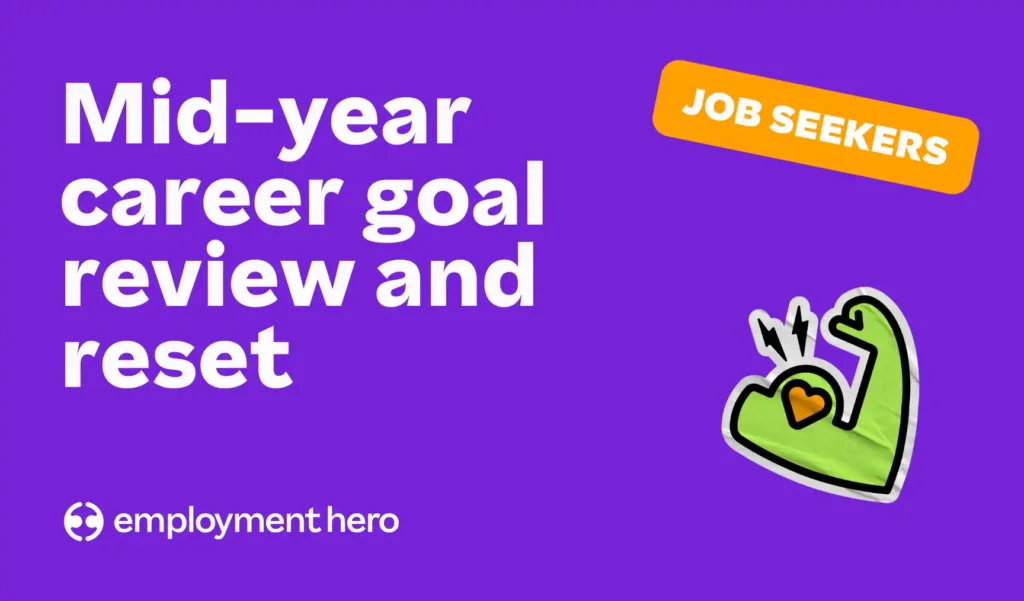Mid-year career review: Reset your goals for success

Contents
Are you halfway through the year and wondering where the time has gone? It’s the perfect moment to step back, reflect and refocus. A mid-year career review is not just about looking at what you’ve achieved so far – it’s a chance to realign your goals and set a clear path for the rest of the year. Whether you’re working toward a promotion, developing new skills, or planning a career shift, taking this time can supercharge your motivation and productivity.
Here’s how you can use a mid-year check-in to stay on track toward your goals.
Why a mid-year career review matters
From fiscal year planning to sector-specific development timelines, a mid-year review helps you benefit from these cycles by actively assessing where you stand and what adjustments may be needed.
Here’s why it’s important:
- Stay ahead of change: Life happens, and priorities shift. Revisiting your goals ensures they remain relevant and achievable amid changing circumstances.
- Boost clarity and confidence: Taking stock reinforces your progress and gives you clear direction on areas that need attention.
- Refocus your purpose: Reflecting aligns your efforts with your long-term ambitions while letting you recalibrate short-term priorities.
By hitting pause now, you give yourself the opportunity to realign before the year gets away from you.
Reflect on the first half of the year
Before forging ahead, take time to reflect. Honest self-assessment not only highlights your wins but also helps pinpoint what’s been holding you back.
Start with these check-in questions
- Are my current goals still meaningful and exciting?
- What accomplishments am I most proud of so far this year?
- Have I faced challenges that I struggled to overcome?
- Are there new skills or certifications, like NZQA qualifications, I should pursue to get ahead?
- How do I feel about work-life balance and my overall energy levels?
Seek feedback beyond yourself
Managers, mentors, and even colleagues can offer a perspective you might not have considered. Input from others can validate areas where you excel and provide constructive insights on how to improve. For professionals in New Zealand’s collaborative work environments, this external feedback is particularly valuable.
Reset your career goals with the SMART framework
Once you’ve reflected, it’s time to reset. The SMART framework is a powerful tool to ensure your career goals are clear, actionable, and success-driven.
What is SMART goal setting?
SMART stands for Specific, Measurable, Achievable, Relevant, and Time-bound. Here’s how you can use this approach:
- Specific: Define what you want in detail. Example goal for a trainer: “Complete an NZQA-accredited training module on team leadership.”
- Measurable: Decide how to track progress. Example metric for a salesperson: “Increase sales by 10% before the next quarter.”
- Achievable: Be ambitious but realistic. Example for an HR professional: “Implement a new onboarding program within 60 days.”
- Relevant: Make sure your goal aligns with your career aspirations. Example for a tradie (tradesperson): “Learn to use advanced safety equipment and qualify for construction leadership roles.”
- Time-bound: Set clear deadlines to stay motivated. Example for early-career professionals: “Attend a local networking event within the next four weeks.”
Breaking large goals into smaller, focused milestones is a practical way to stay on track.
Career goal examples for New Zealand professionals
Want some inspiration? Here are career goal ideas tailored specifically for Kiwi workplaces:
Short-term goals:
- Healthcare professional: Improve patient interactions by taking part in a professional development workshop.
- Educator: Achieve higher student engagement by applying strategies from a literacy teaching webinar.
- Administrator: Refresh skills by enrolling in an NZQA-approved office management course.
- Retail Worker: Earn a certification for advanced point-of-sale systems to take on team training responsibility.
Long-term goals:
- Tradesperson: Work toward managing a crew by completing an NZQA Level 5 Leadership and Management course.
- Civil servant: Secure a project management certification to advance into a team lead role.
- Small business owner: Build an e-commerce section to complement the physical store, targeting a 20% revenue boost by year’s end.
- Graduate: Transition from entry-level tasks to specialist responsibilities within your first year by gaining industry-specific credentials.
Tailoring your goals to your industry helps ensure they’re actionable and have real impact.
Overcome obstacles and thrive
No career path is without its hurdles. Use these strategies to tackle common challenges:
Challenge: Lack of time.
- Solution: Set micro-goals, like dedicating 15 minutes daily to career planning or skill improvement.
Challenge: Uncertainty about next steps.
- Solution: Explore mentorship opportunities or consult a career coach for guidance.
Challenge: Feeling overwhelmed.
- Solution: Break goals into mini-tasks and celebrate small wins to boost your momentum.
Remember, persistence and adaptability are key. Obstacles often lead to growth if you approach them strategically.
Track progress and stay accountable
Consistent follow-ups are essential to keep your goals alive. Here’s how to measure progress and maintain focus:
- Schedule monthly self-assessments.
- Use tools or apps to track your achievements in real-time.
- Establish regular check-ins with your manager or mentor.
For many Kiwi professionals, simple systems like 1-on-1 feedback sessions or structured self-assessment templates can make a big difference. Employment Hero’s platform offers tools specifically designed for tracking career progress and setting actionable goals.
Make the second half of the year count
Your career success is an ongoing process. A mid-year review is about more than just assessing your past; it’s about shaping your future. Use reflection, SMART goal-setting and proactive strategies to relaunch the second half of your year with purpose and clarity.
Remember, small, consistent actions create big achievements. It’s not about how you started the year; it’s about how you finish it. Use our mid-year performance review template to guide your planning. Ready for a new challenge? Check out Employment Hero Jobs for new opportunities.





















